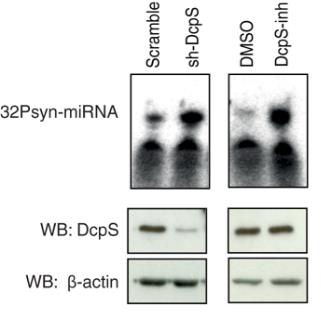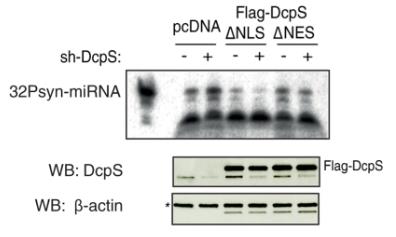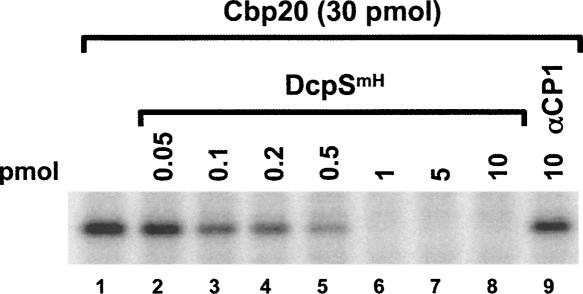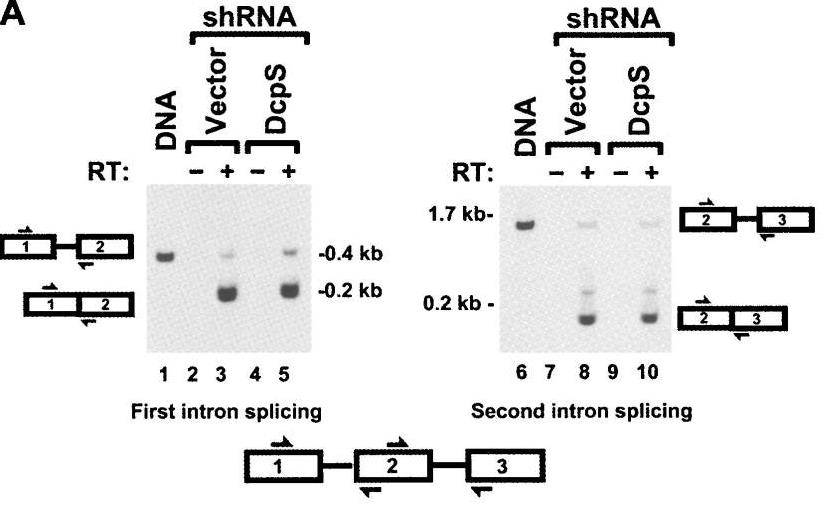Recombinant Human DCPS protein(1-337 aa), His-tagged
| Cat.No. : | DCPS-11862H |
| Product Overview : | Recombinant Human DCPS protein(1-337 aa), fused with N-terminal His tag, was expressed in E.coli. |
| Availability | April 18, 2025 |
| Unit | |
| Price | |
| Qty |
- Specification
- Gene Information
- Related Products
- Case Study
- Application
- Download
| Species : | Human |
| Source : | E.coli |
| Tag : | His |
| Protein Length : | 1-337 aa |
| Form : | The purified protein was Lyophilized from sterile PBS (58mM Na2HPO4,17mM NaH2PO4, 68mM NaCl, pH7.4). 5 % trehalose and 5 % mannitol are added as protectant before lyophilization. The elution buffer contain 300mM imidazole. |
| AA Sequence : | MADAAPQLGKRKRELDVEEAHAASTEEKEAGVGNGTCAPVRLPFSGFRLQKVLRESARDKIIFLHGKVNEASEDGDGEDAVVILEKTPFQVEQVAQLLTGSPELQLQFSNDIYSTYHLFPPRQLNDVKTTVVYPATEKHLQKYLRQDLRLIRETGDDYRNITLPHLESQSLSIQWVYNILDKKAEADRIVFENPDPSDGFVLIPDLKWNQQQLDDLYLIAICHRRGIRSLRDLTPEHLPLLRNILHQGQEAILQRYRMKGDHLRVYLHYLPSYYHLHVHFTALGFEAPGSGVERAHLLAEVIENLECDPRHYQQRTLTFALRADDPLLKLLQEAQQS |
| Purity : | 90%, by SDS-PAGE with Coomassie Brilliant Blue staining. |
| Storage : | Short-term storage: Store at 2-8°C for (1-2 weeks). Long-term storage: Aliquot and store at -20°C to -80°C for up to 3 months, reconstitution with sterile water and addition of an equal volume of glycerol. Avoid repeat freeze-thaw cycles. |
| Reconstitution : | Reconstitute at 0.25 μg/μl in 200 μl sterile water for short-term storage. After reconstitution with sterile water, if glycerol has no effect on subsequent experiments, it is recommended to add an equal volume of glycerol for long-term storage. |
| Gene Name | DCPS decapping enzyme, scavenger [ Homo sapiens ] |
| Official Symbol | DCPS |
| Synonyms | DCPS; HSL1; HINT-5; HSPC015; decapping enzyme, scavenger ; scavenger mRNA-decapping enzyme DcpS; DCS-1; OTTHUMP00000231113; mRNA decapping enzyme; heat shock-like protein 1;histidine triad protein member 5; hint-related 7meGMP-directed hydrolase; homolog of C. elegans 7meGMP-directed hydrolase dcs-1; EC 3 |
| Gene ID | 28960 |
| mRNA Refseq | NM_014026 |
| Protein Refseq | NP_054745 |
| MIM | 610534 |
| UniProt ID | Q96C86 |
| ◆ Recombinant Proteins | ||
| DCPS-2237M | Recombinant Mouse DCPS Protein, His (Fc)-Avi-tagged | +Inquiry |
| DCPS-01C | Recombinant Cynomolgus monkey DCPS Protein, His-tagged | +Inquiry |
| DCPS-4360M | Recombinant Mouse DCPS Protein, His-tagged | +Inquiry |
| DCPS-1571H | Recombinant Human DCPS protein | +Inquiry |
| Dcps-2478M | Recombinant Mouse Dcps Protein, Myc/DDK-tagged | +Inquiry |
| ◆ Cell & Tissue Lysates | ||
| DCPS-7046HCL | Recombinant Human DCPS 293 Cell Lysate | +Inquiry |
Case 1: Meziane O, et al. Sci Rep. 2015
Human DcpS, a bifunctional mRNA decapping enzyme, regulates miRNA degradation via nucleocytoplasmic shuttling and collaborates with Xrn2 exonuclease, independent of its canonical scavenger activity. This conserved role in miRNA turnover highlights DcpS’s dual functionality in post-transcriptional gene regulation, offering insights into RNA metabolism and potential therapeutic targets for RNA-linked diseases.

Fig1. Inhibition of DcpS alters in vitro miRNA degradation.

Fig2. Cytoplasmic but not nuclear DcpS activates in vitro miRNA degradation.
Case 2: Shen V, et al. RNA. 2008
Human DcpS, a nucleocytoplasmic shuttling enzyme, regulates nuclear pre-mRNA splicing by modulating cap-binding complex (CBC) availability through cap hydrolysis. Depleting DcpS disrupts cap-proximal intron splicing via CBC sequestration, reversed by Cbp20 complementation, revealing its dual role in mRNA decay and RNA processing, expanding its functional scope in gene expression regulation.

Fig1. DcpS can displace Cbp20 from cap structure.

Fig2. DcpS affects the splicing efficiency of the rat fibronectin minigene reporter pre-mRNA first intron.

Fig1. DCPS-mediated pre-mRNA metabolic pathway in UM by which disseminated cells gain enhanced malignant features to promote hepatic metastasis. (Bei Jin, 2023)
Not For Human Consumption!
Inquiry
- Reviews
- Q&As
Ask a Question for All DCPS Products
Required fields are marked with *
My Review for All DCPS Products
Required fields are marked with *
Inquiry Basket


